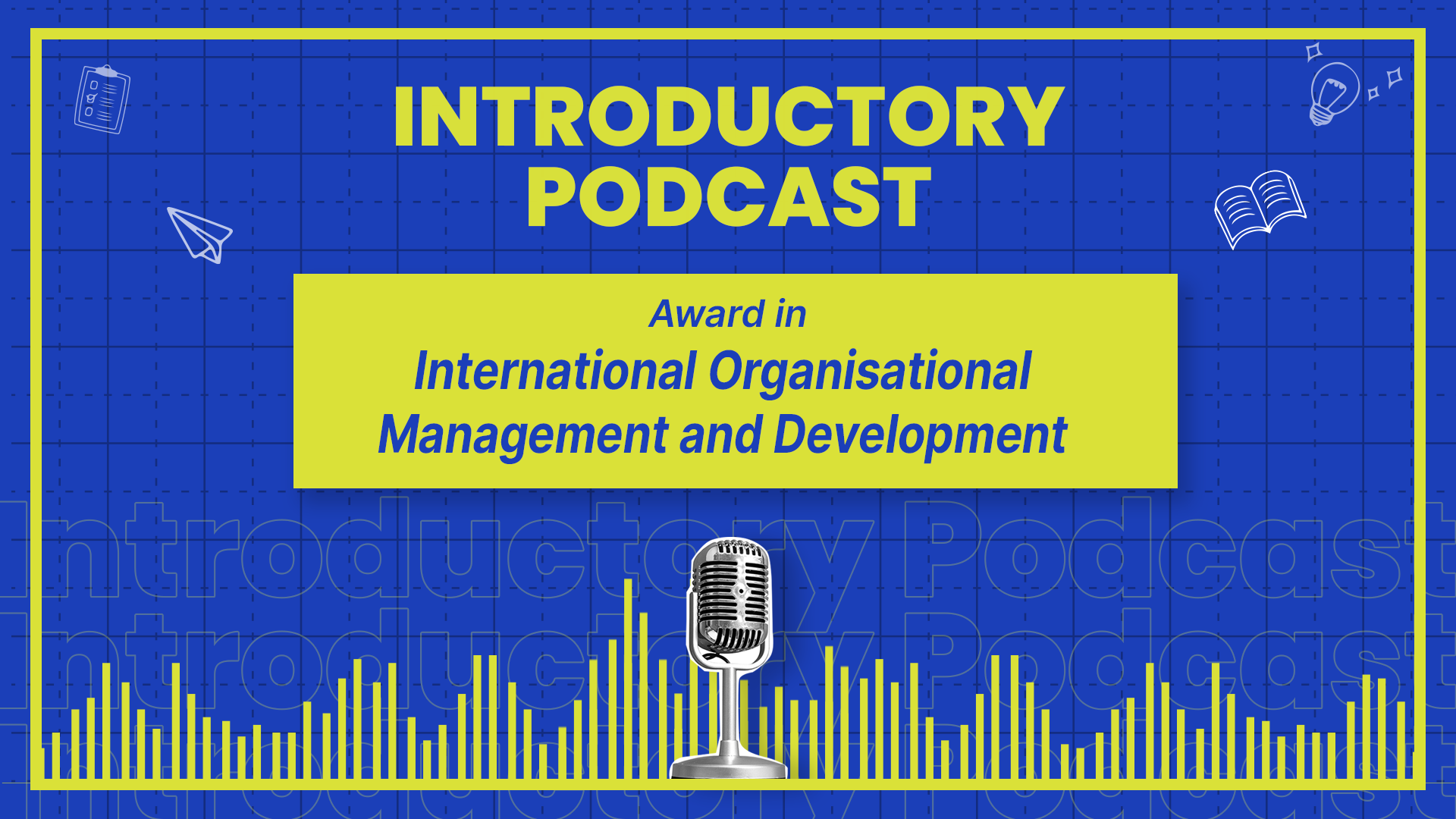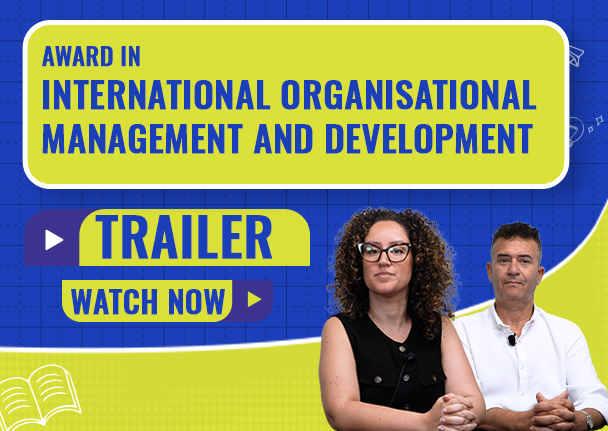Award in International Organisational Management and Development
This module is designed to provide students with a mastery of the theories and practices of international organisational management and development.
-
OrientationDirector’s Introduction03:27Orientation10:52Understanding Podcasts01:46Understanding Pre-recorded Lectures02:25Understanding Pre-recorded Interviews01:54Understanding Case Studies01:47Understanding Discussion Boards02:30Ascencia Style SheetAI PolicyPolicy for Online Interaction and Behaviour for E-Academic Students
-
Coursework: International Organisational Management and DevelopmentIntroductory Podcast00:03:54Assignment Podcast00:05:44
-
Foundations of International Organisational Management and Development; Lecture 1.1Podium Lecture: Introduction to International Organisational Management00:43:19Journal Article: A New Organisational Memory for Cross-Cultural Knowledge ManagementLecture 1.1: Part 1: Link Business Models to Activities Performed by International Organisations00:48:57Lecture 1.1: Part 2: Link Business Models to Activities Performed by International Organisations00:45:34Quiz 1.1: Link Business Models to Activities Performed by International Organisations.Journal Article: The Role and Prospects of Innovative Entrepreneurship in the Economic Progress of Developing CountriesLecture 1.1.2: Part 1(A): Cultural, Political, Economic and Legal Factors that Influence International Business01:17:11Lecture 1.1.2: Part 1(B): Cultural, Political, Economic and Legal Factors that Influence International Business01:08:39Lecture 1.1.2: Part 2: Cultural, Political, Economic and Legal Factors that Influence International Business00:37:57Journal Article: The Cultural, Political and Legal Environment of International Business
-
Foundations of International Organisational Management and Development; Lecture 1.2Lecture 1.2: Part 1: The 4 Fundamental Value Drivers of Business Models to Specialist and Non-Specialist Audiences00:49:39Lecture 1.2: Part 2: The 4 Fundamental Value Drivers of Business Models to Specialist and Non-Specialist Audiences00:42:26Quiz 1.2: The 4 Fundamental Value Drivers of Business ModelsJournal Article: Value Creation in E-Business as a Driver of Financial Performance
-
Foundations of International Organisational Management and Development; Lecture 1.3Lecture 1.3: Part 1: The 4 Major Business Threats00:43:24Lecture 1.3: Part 2: The 4 Major Business Threats00:45:03Quiz 1.3: The 4 Major Business ThreatsJournal Article: Development of Market Orientation for Marketing Strategy
-
Foundations of International Organisational Management and Development; Lecture 1.4Lecture 1.4: International Business Model Canvas Application01:33:17Quiz 1.4: Understand and Practically Apply the Business Model CanvasJournal Article: Business Model Canvas in Global EnterprisesPodium Lecture: International Business Strategy: Market Entry & Growth00:36:36Journal Article: International Market Entry StrategiesPodium Lecture: Platformisation and the Rise of Global Digital Ecosystems00:37:30Journal Article: Digital Platforms in the Global EconomyPodium Lecture: Organisational Foresight: Designing the Future-Ready Enterprise00:46:56Journal Article: An Overview of Foresight MethodologiesPodium Lecture: Organisational Change & Development in Global Contexts00:45:47Journal Article: Social Psychological Perspectives of Workforce Diversity and Inclusion in National and Global ContextsGuest Interview: Trevor00:34:17
-
International Resource Control; Lecture 2.1Lecture 2.1: Defining Goals Through Global Collaboration01:24:57Quiz 2.1: Strategically Collaborate with Different Stakeholders on an International Level Within an Organisation to Define Company GoalsJournal Article: Strategy Stakeholders and Managerial DiscretionLecture 2.1.1: Virtual Meeting and Conferencing Tools that Facilitate Communication and Collaboration Among Team Members and Stakeholders in Different Locations00:44:50Journal Article: Realizing an Online ConferencePodium Lecture: Organisational Intelligence and Decision Systems in Global Firms00:37:59Journal Article: Organisational Transformation Through Business Intelligence
-
Managing Diverse International Teams; Lecture 3.1Podium Lecture: The Role of Culture in International Organisations00:48:57Journal Article: Culture Influence in International OrganisationsPodium Lecture: KM in Global Teams00:41:50Journal Article: Sustaining Effectiveness in Global TeamsPodium Lecture: Measuring Performance & Driving Global Improvement00:43:05Journal Article: Driving Continuous Improvement by Developing and Leveraging Lean Key Performance Indicators
-
Managing Diverse International Teams; Lecture 3.2Lecture: Part 1: Theories of Compensation Planning from Around the World00:41:06Lecture: Part 2: Theories of Compensation Planning from Around the World00:42:48Lecture: Part 1: A Look at Benchmarking of Salaries Within Countries and Across Countries00:43:51Lecture: Part 2: A Look at Benchmarking of Salaries Within Countries and Across Countries00:48:03Lecture: Part 1: Legal and Ethical Considerations in Performance Management from Around the Globe00:52:28Lecture: Part 2: Legal and Ethical Considerations in Performance Management from Around the Globe00:43:00Podium Lecture: International Performance Management00:22:51Podium Lecture: Innovation and Organisational Learning Globally00:42:25Journal Article: The Significance of Organisational Learning in a Global ContextGuest Interview: Italo00:34:17
-
International Leadership Skills; Lecture 4.1Lecture 4.1: Lead Multinational Teams in Strategic Thinking, Decision-Making and Cross-Cultural Communication01:25:07Journal Article: Developing Cross-Cultural Leadership Skills and Cross-Cultural Team Working Skills Through Organization Development InterventionLecture 4.1.1: Part 1: Effective Communication Across Language Barriers01:21:26Lecture 4.1.1: Part 2: Effective Communication Across Language Barriers01:05:38Journal Article: Breaking Language BarriersLecture 4.1.2: Part 1: Cloud-Based Solutions that Allow Organisations to Store and Access Data and Information from Anywhere, Facilitating Remote Work and Collaboration00:47:18Lecture 4.1.2: Part 2: Cloud-Based Solutions that Allow Organisations to Store and Access Data and Information from Anywhere, Facilitating Remote Work and Collaboration00:48:19Lecture 4.1.2: Part 3: Cloud-Based Solutions that Allow Organisations to Store and Access Data and Information from Anywhere, Facilitating Remote Work and Collaboration00:41:27Journal Article: Leveraging Cloud-Based HR Tools for Remote Workforce
-
International Leadership Skills; Lecture 4.2Lecture 4.2: Team Roles & Personality Dynamics00:52:53Journal Article: Personality and Team PerformancePodium Lecture: HRM in the International Context00:46:43Journal Article: New Models of Strategic HRM in a Global ContextPodium Lecture: Neurodiversity and Cognitive Inclusion in Global Organisations00:46:11Journal Article: Strategic Need For TalentPodium Lecture: Diversity, Equity, and Inclusion (DEI) in Global Organisations00:48:54Journal Article: The New Diversity, Equity and InclusionJournal Article: The Influence of Quality Tools in Human Resources ManagementLecture 4.2.2: Part 1: Skilfully Differentiate the Roles of Top Management, Line Management and Human Resource Specialist in the Application of Organisational Goals00:58:52Lecture 4.2.2: Part 2: Skilfully Differentiate the Roles of Top Management, Line Management and Human Resource Specialist in the Application of Organisational Goals00:54:06Journal Article: What a Difference a Role MakesGuest Interview: Tess Giordmaina00:34:04
-
Global Business Strategy; Lecture 5.1Podium Lecture: Social Responsibility & Sustainability in Global Operations00:44:08Journal Article: International Business, Corporate Social Responsibility and Sustainable DevelopmentPodium Lecture: Organisational Structures Across Borders00:40:53Journal Article: Factors Influencing Cross-Border Knowledge Sharing by Police OrganisationsPodium Lecture: Strategic Organisational Design for Global Firms00:43:24Journal Article: Business Organisational Structures of Global CompaniesLecture 5.1: Developing & Endorsing Organisational Procedures01:23:15Quiz 5.1: Construct and Sign-Off on Organizational Policies and Procedures in Line with the Organization’s GoalsJournal Article: Organisational Policies and Practices for the Inclusion of Vulnerable WorkersLecture 5.1.1: Part 1: Represent Organisations in International Business Negotiations00:53:03Lecture 5.1.1: Part 2: Represent Organisations in International Business Negotiations00:50:00Quiz 5.1.1: Represent Organisations in International Business NegotiationsJournal Article: International Business Negotiations. Culture, Dimensions, ContextLecture 5.1.1.2: Part 1: Decision Making in Global and Cross-Cultural Contexts00:43:23Lecture 5.1.1.2: Part 2: Decision Making in Global and Cross-Cultural Contexts00:37:00Journal Article: Decision-Making Behavior, Gender Differences, and Cultural Context Variables
-
Global Business Strategy; Lecture 5.2Lecture 5.2: Global Risk Management Strategies01:26:04Quiz 5.2: Develop and Implement a Global Risk Management PlanJournal Article: Aspects of the Evolution from Risk Management to Enterprise Global Risk ManagementPodium Lecture: Risk Assessment and Decision Making in Global Business00:52:51
-
Global Business Strategy; Lecture 5.3Lecture 5.3: Part 1: Staying Updated on Trade, Regulations, and Global Market Movements01:13:05Lecture 5.3: Part 2: Staying Updated on Trade, Regulations, and Global Market Movements00:55:38Quiz 5.3: Master the Art of Staying Up-to-Date on International Trade AgreementsJournal Article: On the Endogeneity of International Trade Flows and Free Trade AgreementsPodium Lecture: Shadow Structures and Informal Power in Multinational Firms00:44:16Journal Article: In the Shadow: The Impact of Language on Structure, Power and Communication in the MultinationalLecture 5.3.1: Part 1: Exploring Cultural Differences and Market Preferences Across Global Regions01:11:13Lecture 5.3.1: Part 2: Exploring Cultural Differences and Market Preferences Across Global Regions00:56:22Quiz 5.3.1: Market and Cultural Intelligence ToolsJournal Article: Leader Cultural Intelligence and Organizational PerformancePodium Lecture: AI-Powered Organisational Knowledge & Memory Systems00:44:36Journal Article: Artificial Intelligence and Knowledge ManagementPodium Lecture: Digital Sovereignty and Data Ethics in International Management00:34:50Journal Article: Sovereignty, Privacy, and Ethics in Blockchain‑Based Identity Management Systems
-
The Future of International Organisational Management; Lecture 6.1Podium Lecture: Building Organisational Agility00:26:43Podium Lecture: The Future of International Organisational Management00:40:27Journal Article: Will the Organisation Disappear? The Challenges of the New Economy
This module is designed to provide students with a mastery of the theories and practices of international organisational management and development. International organisational management and development involves creating a plan, monitoring its progress, and making changes based on results and feedback so the company can improve its performance. In this module, students will explore international organisational management and development as a strategy that companies worldwide use to structure their leadership, control their resources and achieve organisational goals. Students will understand the cultural, political, economic and legal factors that influence international business, and examining the role of culture in shaping organisational behaviour and developing effective strategies for managing diverse teams.
Programme Outcomes
- Spearhead multinational teams, leading them in strategic thinking, decision making and cross-cultural communication
- Provide consultation advice on improving organisational performance and competitiveness in an international context through organisational design, structure and culture management
- MQF/EQF Level 6 qualification. However, students’ circumstances and experiences may also be considered during the application process—five years of relevant working experience in the industry of specialization.
- Proof of B2 level of English should be provided by the students upon application – IELTS level/grade 6 or the student’s country equivalent.
- A Bachelor’s degree or graduate degree in humanities, sciences, human resources, organisational behaviour, business, administration, management, communication, journalism, psychology, arts or a related field.
- Minimum 180 ECTS at MQF/EQF Level 6 previously acquired at a Higher Education institution.
- Outstanding written and oral communication skills.
- A minimum of one year of work experience in a business environment will be considered as an asset.
Course Syllabus Podcast
Gain a Comprehensive Understanding of the Course Syllabus with Our Informative Podcast.
- Multiple choice assessment - 10%
- Individual assignment - 90%
- E-portfolio
- You can submit your assessment at any time during the course.
What’s included
-
Duration :Full Time - 3 Months
Part Time - 6 Months - Learning: 250 +Hours
- Blockchain Certificate

